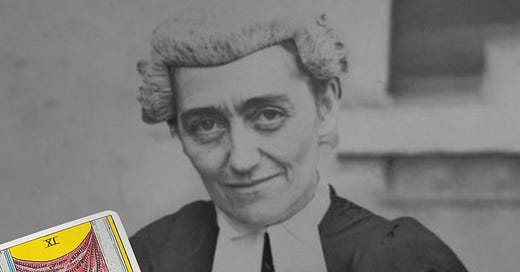Averil Deverell and Justice
Averil Deverell, one of the first two women barristers in all of Great Britain and Ireland, was born in Greystones in 1893. She was a twin and only daughter of William Deverell, Clerk for the Crown and Peace in Wicklow, and Ada Kate Statter.
Averil was presented at court in Dublin Castle in July 1911 during the visit of the English King George V and Queen Mary. Later that year, she entered Trinity as a law student, only a few years after the College decided to admit women. While studying, she wrote of her support for women’s suffrage. She graduated with an LL.B. in 1915.
On the outbreak of World War I, Averil applied to the headquarters of the Queen Alexandra First Aid Nurse Yeomanry to become an ambulance driver. She passed a driving test at the Royal Automobile Club in London, but was unable to re-assemble a dismantled engine and so failed to meet all the requirements. However, six months later this requirement was dropped, and she joined the ambulance corps in France.
Women won the right to vote in Ireland in 1918, and the 1919 Sex Disqualification (Removal) Act allowed women to be appointed to public office. In 1919, Averil and Frances Christian Kyle became the first women to be admitted to the King's Inns. She was the second of two women called to the Bar on 1 November 1921, alongside 18 men, including her twin brother, Captain William Deverell.
At the Bar, she became a campaigner for gender equality. She was the first Irish woman barrister to appear before the Privy Council in London as a junior in 1928, and also the first woman to appear in the Supreme Court of Ireland and the Court of Criminal Appeal in Ireland.
She became known as ‘Mother of the Bar’, mentoring a number of women barristers and advocating gender equality in the profession. Only twelve women were called to the Bar between 1921 and 1950. When the women's dressing room in the Law Library was moved in the 1930s, she organised women colleagues in a campaign to get their original room back; when the words ‘Lady Barristers’ appeared on the door, she insisted that this should be replaced with ‘Women Barristers’.
She remained active in her career, practicing for over 40 years, appearing in many cases, and giving numerous written opinions on complex legal subjects.
She lived in her childhood home in Greystones and in her spare time was a breeder of cairn terriers, running a kennel for dogs named the ‘Brehon Kennels.’ She died in 1979, the same year Mella Carroll became the first Chairwoman of the Bar Council.
XI Justice
Justice speaks to truth, integrity, and the consequences of our actions. Life may not always be fair, but this card brings hope that justice will prevail before long. The card can signify a time when wrongs are corrected and it suggests that things will turn out in our favour when we do the ‘right’ things; it heralds a time when hard work and diligence will pay off. The card asks us to account for our actions, reflect on the results, and learn from the experience. It asks us to review the cause and effect of events to gain clarity and understanding of the situation in which we find ourselves.
The card can also speak to decisions and the need to weigh our options as we choose our next move. It recommends using logic and caution when making important decisions; to weigh up the pros and cons.
Lady Justice holds an upright double-edged sword, symbolising the duality in life; the card reminds us that there are two sides to the story; that truth can sometimes be relative, and moral codes vary widely. Justice reminds us that ultimately, the Judge and Jury reside within. The card asks us to be true to ourselves as we make our decisions based on our own codes of ethics and moral values.
The Justice card speaks to more than just fairness, it is about redressing imbalances to restore order, just like Averil fought for gender equality for herself and others.
Sources
Oxford Dictionary of National Biography entry for Averil Deverell, 2018.
Dictionary of Irish Biography entry for Averil Deverell, 2009
Parkes, Susan, “A Danger to the Men? A History of Women in Trinity College 1904-2004”, Lilliput Press, 2004.





